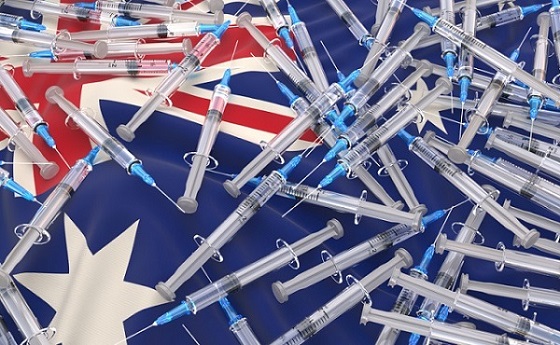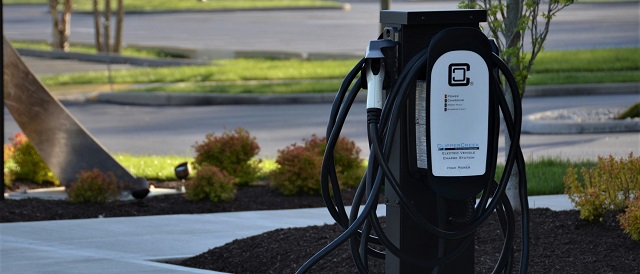COVID-19
Australian court rules COVID jab mandate for first responders violated Human Rights Act

From LifeSiteNews
By David James
Mining billionaire Clive Palmer, founder of the United Australia Party, funded the action and said afterwards that he was willing to back other class actions by affected workers. He called for the presidents and executives of the Queensland Police and Ambulance unions to “do the honourable thing and resign from their roles
In another blow to the legitimacy of Australian governments’ anti-COVID-19 measures, among the most severe in the world, a judge in the Queensland Supreme Court has ruled that the COVID shot mandates for police and ambulance staff were unlawful.
The judge, Glenn Martin, found that there was a breach under the Human Rights Act: specifically the right not to be subjected to non-consensual medical treatment. He ruled there was a failure “to give proper consideration to a human right relevant to the decision,” rendering the mandate unlawful.
The judge ordered that the police commissioner no longer take steps to enforce the mandates or continue any disciplinary proceedings. He ordered that the director general of Queensland Health also be restrained from any enforcement of the vaccine direction, and that no disciplinary proceedings could be taken against those applicants.
READ: South Australian court rules employers who mandated COVID jabs can be held liable for injuries
Although on the face of it the decision has potentially far reaching consequences for the many Australian workers who refused to comply with mandates, the finding was based on a technicality, rather than a matter of ethical or legal principle.
Health Minister Shannon Fentiman said the ruling was made “in relation to how the directives were made, not the directives themselves.” She said the judge found that limiting people’s human rights in having healthcare imposed upon them without consent was “justified because of the pandemic.”
It indicates that Australian judges continue to work on the basis that COVID-19 was a deadly pandemic, which justified suppressing individuals’ right to make decisions about their own health. Contrary to that assumption, the Australian Bureau of Statistics (ABS), which compiles its records from death certificates, found that 2020 and 2021 had the lowest level of deaths from respiratory diseases since records have been kept.
So where was the pandemic? The answer is in computer modelling that turned out to be totally wrong. An example of this irresponsible use of modelling, rather than actual evidence, was referenced in the case. The police service claimed that “modelling” indicated that Queensland Police Service (QPS) personnel would have over two million contacts with the community every year. The judge criticized this, noting that it was for 2019/20 and “did not provide any predictions of the effect of the pandemic on the QPS.” Queensland Police Commissioner Katarina Carroll resigned the day before the decision was handed down.
All Australian state governments relied on deeply flawed modelling, especially the former premier of Victoria, Daniel Andrews.
For the law to work properly the assumption that there was a pandemic in Australia needs to be exposed as incorrect. There was only a pandemic of testing, from which illogical or flawed conclusions were drawn. It triggered panic in the Australian community. For the first time in human history people were considered to have a disease, to be a “case,” when they were healthy. Problems include:
- The PCR test used to identify COVID “cases” was not suitable as a diagnostic tool, as the inventor Kary Mullis noted.
- Because the specifics of the Sars-CoV-2 virus were not available in the early stages due to Chinese reluctance to provide details, the PCR test was based on an old flu virus. The FDA admitted that the test was developed not with actual samples of COVID-19, but with what appears to be genetic material from a common cold virus. Tellingly, in 2019 the ABS recorded 4,124 deaths from flu. In 2021 it recorded only two.
- According to the Worldometer, 80 percent of people in Australia who tested positive to COVID-19 experienced no symptoms. This meant either that the test was flawed or their immune systems had dealt with it.
- Mortality from respiratory disease in the period when there was supposed to be a pandemic was unusually low. According to the ABS deaths from COVID-19 in 2020-21 were under 2,000 – far lower than the 4,124 in 2019 from flu.
- The epidemiological modelling was based on “cases,” following positive testing from the PCR or lateral flow tests. This resulted in an absurdly inflated picture of the risks.
Even if it is accepted that these were understandable mistakes, the fact remains that the Australian authorities got it completely wrong; that should have legal implications for the people who lost their livelihoods. Courts, after all, typically focus on evidence, not speculation, even when that guessing comes from complex computer modelling.
Mining billionaire Clive Palmer, founder of the United Australia Party, funded the action and said afterwards that he was willing to back other class actions by affected workers. He called for the presidents and executives of the Queensland Police and Ambulance unions to “do the honourable thing and resign from their roles in supporting the decisions to have officers vaccinate against their wishes.”
If there is to be widespread justice, however, it would seem to be necessary to go beyond just the wording of the vaccine mandate directives and expose how wrong the authorities were when they imposed savage restrictions on the Australian work force and community.
Until judges realise that their assumptions about the “pandemic” are wrong they will continue to put a false idea of the common good above respect for individual rights.
COVID-19
NIH Quietly Altered Definition For Gain-Of-Function Research On Its Website, Former Fauci Aide Confirms

 From the Daily Caller News Foundation
From the Daily Caller News Foundation
By JASON COHEN
National Institutes of Health (NIH) Principal Deputy Director Lawrence Tabak confirmed on Thursday that his agency’s communications department altered NIH’s definition for gain-of-function research, with the change being “vetted” by “experts.”
The NIH until Oct. 20, 2021 defined this research as “modif[ying] a biological agent so that it confers new or enhanced activity to that agent,” while “some scientists use the term broadly to refer to any such modification,” according to the House Oversight Committee. Republican Rep. Nicole Malliotakis of New York questioned Tabak, a former aide to Dr. Anthony Fauci, about the agency changing its definition of the research on its website, asking him who authorized the alteration.
WATCH:
The current website does not define gain-of-function research, but asserts this research is usually uninvolved with enhanced potential pandemic pathogens.
“The change was made by our communications department because of the confusion that people have about the generic term of gain-of-function and the specific term gain-of-function,” Tabak testified.
Malliotakis responded by suggesting the communications department would not be qualified to make a change like this and must have had other input.
“The content was vetted,” Tabak testified. “By individuals who are subject-matter experts.”
Fauci firmly denied that the National Institute of Allergy and Infectious Diseases (NIAID) funded gain-of-function research on bat-based coronaviruses at the Wuhan Institute of Virology (WIV) before the COVID-19 pandemic during a Senate hearing in May 2021.
“The NIH has not ever and does not now fund gain of function research in the Wuhan Institute of Virology,” Fauci said.
Tabak testified on Thursday that the NIH did fund this research at the Wuhan Institute of Virology, but it “depends on [the] definition.”
The NIAID, which Fauci previously led, funded the nonprofit group EcoHealth Alliance to study bat-based coronaviruses in China that consisted of the transfer of $600,000 to the WIV, the Daily Caller News Foundation previously reported.
COVID-19
COVID Lab Leak: Over four later, EcoHealth Alliance funding is finally suspended

From Heartland Daily News
Thursday, May 16, 2024
Federal Funding Stripped From Nonprofit at Center of COVID Lab Leak Controversy
Today, the Biden administration suspended federal funding to the scientific nonprofit whose research is at the center of credible theories that the COVID-19 pandemic was started via a lab leak at the Wuhan Institute of Virology.
This morning, the U.S. Department of Health and Human Services (HHS) announced that it was immediately suspending three grants provided to the New York-based nonprofit EcoHealth Alliance (EHA) as it starts the process of debarring the organization from receiving any federal funds.
“The immediate suspension of [EcoHealth Alliance] is necessary to protect the public interest and due to a cause of so serious or compelling a nature that it affects EHA’s present responsibility,” wrote HHS Deputy Secretary for Acquisitions Henrietta Brisbon in a memorandum signed this morning.
For years now, EcoHealth has generated immense controversy for its use of federal grant money to support gain-of-function research on bat coronaviruses at the Wuhan lab.
In a memo justifying its funding suspension, HHS said that EcoHealth had failed to properly monitor the work it was supporting at Wuhan. It also failed to properly report on the results of experiments showing that the hybrid viruses it was creating there had an improved ability to infect human cells.
Congressional Republicans leading an investigation into EcoHealth’s research in Wuhan, and the role it may have played in starting the pandemic via a lab leak, cheered HHS’s decision.
“EcoHealth facilitated gain-of-function research in Wuhan, China without proper oversight, willingly violated multiple requirements of its multimillion-dollar National Institutes of Health [NIH] grant, and apparently made false statements to the NIH,” said Rep. Brad Wenstrup (R–Ohio), chair of the House’s Select Subcommittee on the Coronavirus Pandemic in a statement. “These actions are wholly abhorrent, indefensible, and must be addressed with swift action.”
Beginning in 2014, EcoHealth received a grant from NIH’s National Institute of Allergies and Infectious Diseases (NIAID) to study bat coronavirus in China. Its initial scope of work involved collecting and cataloging viruses in the wild and studying them in the lab to spot which ones might be primed to “spillover” into humans and cause a pandemic.
Soon enough, EcoHealth used some of the viruses they’d collected to create “chimeric” or hybrid viruses that might be better able to infect human lung cells in genetically engineered (humanized) mice.
This so-called “gain-of-function” research has long been controversial for its potential to create deadly pandemic pathogens. In 2014, the Obama administration paused federal funding of gain-of-function research that might turn SARS, MERS, or flu viruses into more transmissible respiratory diseases in mammals.
In 2016, NIH flagged EcoHealth’s work as likely violating the 2014 pause.
EcoHealth President Peter Daszak argued to NIH at the time that the viruses his outfit was creating had not been proven to infect human cells and were genetically different enough from past pandemic viruses that they didn’t fall under the Obama administration pause.

Wuhan Institute of Virology and Peter Daszak of EcoHealth Alliance
NIH accepted this argument under the condition that EcoHealth immediately stop its work and notify the agency if any of its hybrid viruses did show increased viral growth in humanized mice.
But when these hybrid viruses did show increased viral growth in mice, EcoHealth did not immediately stop work or notify NIH. It instead waited until it submitted an annual progress report in 2018 to disclose the results of its experiments.
A second progress report that EcoHealth submitted in 2021, two years after its due date, also showed its hybrid viruses were demonstrating increased viral growth and enhanced lethality in humanized mice.
In testimony to the House’s coronavirus subcommittee earlier this month, Daszak claimed that EcoHealth attempted to report the results of its gain-of-function experiments on time in 2019, but was frozen out of NIH’s reporting system.
The HHS memo released today says a forensic investigation found no evidence that EcoHealth was locked out of NIH’s reporting system. The department also said that EcoHealth had failed to produce requested lab notes and other materials from the Wuhan lab detailing the work being done there and the lab’s biosafety conditions.
These all amount to violations of EcoHealth’s grant agreement and NIH grant policy, thus warranting debarment from future federal funds, reads the HHS memo.
That EcoHealth would be stripped of its federal funding shouldn’t come as too great a shock to anyone who watched Daszak’s congressional testimony from earlier this month. Even Democrats on the committee openly accused Daszak of being misleading about EcoHealth’s work and manipulating facts.
Rep. Raul Ruiz (D–Calif.), the ranking Democrat on the House’s coronavirus subcommittee, welcomed EcoHealth’s suspension, saying in a press release that the nonprofit failed its “obligation to meet the utmost standards of transparency and accountability to the American public.”
An HHS Office of the Inspector General report from last year had already found that EcoHealth had failed to submit progress reports on time or effectively monitor its subgrantee, the Wuhan Institute of Virology.
When grilling Daszak, Democrats on the Coronavirus Subcommittee went to great lengths to not criticize NIH’s oversight of EcoHealth’s work. The HHS debarment memo likewise focuses only on EcoHealth’s failures to abide by NIH policy and its grant conditions.
Nevertheless, it seems pretty obvious that NIH was failing to abide by the 2014 pause on gain-of-function funding when it allowed EcoHealth to go ahead with creating hybrid coronaviruses under the condition that they stop if the viruses did prove more virulent.
NIH compounded that oversight failure by not stopping EcoHealth’s funding when the nonprofit did, in fact, create more virulent viruses, and not following up on a never-submitted progress report detailing more gain-of-function research until two years later.
The House Subcommittee’s investigation into NIH’s role in gain-of-function research at the Wuhan lab is ongoing. Tomorrow it will interview NIH Principal Deputy Director Lawerence Tabak. In June, it will interview former NIAID Director Anthony Fauci.
Originally published by Reason Foundation. Republished with permission.
-

 armed forces2 days ago
armed forces2 days agoTrudeau government has spent $10 million promoting DEI in the military as recruitment flounders
-

 COVID-192 days ago
COVID-192 days agoJapan’s most senior cancer doctor: COVID shots are ‘essentially murder’
-

 Alberta2 days ago
Alberta2 days agoProvince announces next step to revamped health care system
-

 Automotive1 day ago
Automotive1 day agoRed States Sue California and the Biden Administration to Halt Electric Truck Mandates
-

 Automotive1 day ago
Automotive1 day agoGovernments in Canada accelerate EV ‘investments’ as automakers reverse course
-

 COVID-192 days ago
COVID-192 days agoTrudeau government only sought legal advice after Emergencies Act was invoked, records indicate
-

 Economy1 day ago
Economy1 day agoBiden signs suicidal ‘No Coal’ pact, while rest of world builds 1,000 new plants
-

 Alberta1 day ago
Alberta1 day agoPharmacist-led clinics improve access to health care: Lessons from Alberta







